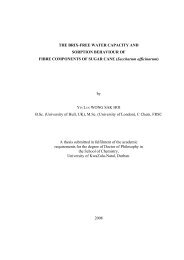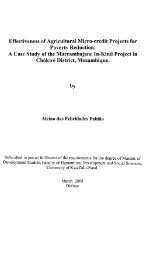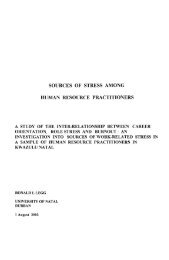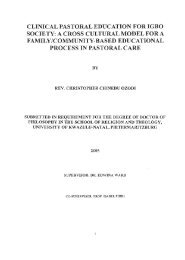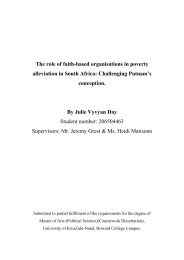View/Open - ResearchSpace - University of KwaZulu-Natal
View/Open - ResearchSpace - University of KwaZulu-Natal
View/Open - ResearchSpace - University of KwaZulu-Natal
You also want an ePaper? Increase the reach of your titles
YUMPU automatically turns print PDFs into web optimized ePapers that Google loves.
eplenishment was a challenge. On the contrary, the results <strong>of</strong> this study show that the<br />
government through the department <strong>of</strong> health cut down the supply <strong>of</strong> HBC kits. This shows<br />
more nuanced understanding <strong>of</strong> the problems on resources for infection control practices.<br />
These findings imply that infection control protocols could not be followed by volunteer<br />
caregivers. These findings could have a negative impact on the patients in that, most patients<br />
could be neglected consequently the quality <strong>of</strong> care provided to them could be compromised<br />
and patients could be susceptible to death. However, in order for HBCOs to function<br />
properly, there is need for the government to allocate adequate resources for infection control<br />
practices and establish a central <strong>of</strong>fice that could oversee infection control practices in<br />
HBCOs.<br />
Exo level<br />
Home-based care organisations in this study acknowledged the importance <strong>of</strong> training for<br />
their volunteer caregivers as such, most HBCCs/project managers ensured that volunteer<br />
caregivers received training when enrolled into HBC programs. However, this study extends<br />
knowledge in this area <strong>of</strong> training regarding infection control practices. Findings suggest that<br />
most HBCOs did not have internal trainers hence, they depended pr<strong>of</strong>oundly on the DoH to<br />
<strong>of</strong>fer training to volunteer caregivers. This implies that most HBCOs have little influence<br />
regarding training, however, this could be the reason why most HBCOs wait for long periods<br />
<strong>of</strong> time to receive training for their volunteer caregivers. It could also contribute to lack <strong>of</strong><br />
sufficient knowledge regarding infection control practices. For example, only one project<br />
manager/HBCC who was a retired nurse provided training to volunteer caregivers on<br />
infection control practices while waiting for an external trainer. This implies that infection<br />
control practices could be affected negatively because volunteer caregivers begin to care for<br />
patients without appropriate and adequate training as such they are at risk <strong>of</strong> being infected<br />
while caring for the patients. These findings highlight the need for the DoH to <strong>of</strong>fer regular<br />
training with refresher courses and also train internal trainers in HBCOs who could also be in<br />
charge <strong>of</strong> overseeing infection control practices in the organisations.<br />
63




